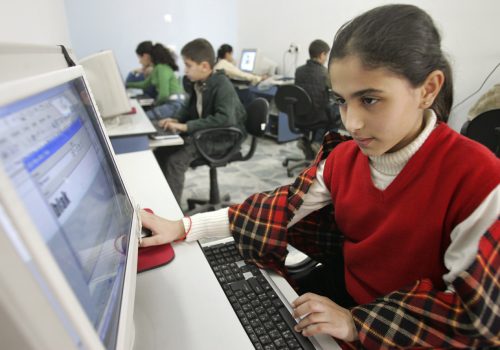There’s a gendered brain drain in MENA. It’s because women are unrecognized and underestimated.
It’s no secret that the Middle East and North Africa (MENA) region is facing the consequences of a widespread brain drain—a rapid migration flow by highly-skilled and educated people—to the Global North. However, the gendered nature of this phenomenon is often overlooked. The feminization of migration flowing out of MENA can be attributed to the limited career opportunities available to women at home. If this trend continues to be unrecognized and unaddressed, it can have major consequences for the regional economy and stall development.
This female-oriented brain drain is an under-researched and underrecognized phenomenon seriously impacting the contemporary Middle East and North Africa. Part of this is due to the lack of relevant data and a widespread international tendency to underestimate the potential of women’s participation in the workforce. However, the existing data on women’s education, participation in the labor market, and migration patterns demonstrates a correlation and indicates a disproportionate desire for women to seek career opportunities elsewhere.
As women gain access to education, their involvement in the workforce lags. The average female-to-male tertiary education ratio is 108 percent, with more women obtaining university degrees. Yet, the World Bank has reported that the labor force participation rate for women is 19 percent compared to the 71 percent rate for men. The increasing number of women and girls who are provided access to education closely aligns with the increasing number of women who are emigrating from the Middle East. Many of them are migrating independently for career advancement and educational opportunities.
This correlation is evident in Egypt, where half of the doctors—the majority of whom are women—have left the country to pursue career opportunities in the healthcare field. Women are also more likely to remain abroad over their male due to gender disparities in the labor markets back home. Not only are numbers high in countries such as Syria and Yemen, which are currently facing widespread and violent conflict, but countries such as Jordan and Morocco, which should otherwise have high female employment rates and low brain drain rates, remain some of the worst in the world for female economic participation.
Causes for female brain drain
Although women’s education is increasing rapidly, there are many gendered factors that both prevent women from entering the workforce and deter them from remaining in it. Women are often hesitant to pursue career ambitions or are pushed out of their careers due to workplace harassment, discriminatory employment practices, a dearth of safe transportation options, and social norms. Additionally, women have to take on the majority of childcare responsibilities without a range of public childcare options available to ccompensate for the disproportionate burden.
Women also face low wages, meaning that they expect to receive minimal returns on the heavy investment they made to pursue their careers. This is exacerbated by the fact that women are often the last to be hired and the first to be fired—a phenomenon that increased dramatically due to the COVID-19 pandemic. If they do manage to obtain a job or keep it, they have fewer opportunities to advance in their careers once they enter the workforce. This glass ceiling for women in MENA has often been attributed to traditional gender roles and discriminatory practices.
Why women matter
It is well known that women’s economic participation improves and promotes the overall economic development of the region. If female brain drain continues to accelerate, the entire region will face the consequences, including economic stagnation and the social ostracization of an underutilized demographic. A 2022 PricewaterhouseCoopers (PwC) study found that improving the female employment rate to meet the current male employment rate could increase the region’s GDP by up to 57 percent, which translates to $2 trillion. Egypt, Jordan, and Lebanon are expected to benefit the most from improving female employment rates. Additionally, improving female representation in positions of power and diplomacy has been proven to encourage more sustainable peace and increased democratization in the region. For these reasons, it would benefit all parties involved to take action against women’s brain drain in MENA.
This can involve deliberate steps to increase economic opportunities for women and foster a more inclusive, female-oriented workplace, such as quota-based initiatives and female-oriented legislation. Legislation would include protections for women against workplace harassment, assistance in childcare responsibilities, and equal payment.
The efficacy of gender-based labor legislation is evident in Gulf countries. While Saudi Arabia suffered a major gendered brain drain in the early twentieth century, women’s participation in the economy has grown significantly, rising to a record 37 percent in 2022 due to gender reforms implemented in the prior five years and the Vision 2030 economic diversification plan. These measures included quota-based initiatives that aimed to increase women’s participation to 30 percent, a ban on gender discrimination in the workplace and discriminatory hiring or firing practices, and the criminalization of sexual harassment. These types of measures must be implemented across the Middle East in order to even the playing field for women in the workforce.
The PwC’s 2022 survey found that the factors enabling women to go into work include relevant workplace policies as well as the ability to work remotely, access to transport, flexible hours, and access to jobs that match their skills. Policymakers must keep these factors at the forefront to compel women to contribute to the labor force. Additional solutions to this problem could include female-oriented grants or scholarships. Finally, the current social norms prohibiting women from career aspirations must be challenged. That taboo is more than a detriment to women—it is a problem for us all. If steps like these are not taken, women will continue to depart MENA at an increasing rate.
Britt Gronemeyer is a Young Global Professional at the Atlantic Council’s Rafik Hariri Center and Middle East Programs.
Further reading
Wed, May 3, 2023
Modernizing MENA education: How to close the career success gap
MENASource By Nibras Basitkey
The education systems in the MENA region are failing to keep pace with the rapidly evolving labor market, which is increasingly characterized by emerging technologies, innovation, and entrepreneurship.
Tue, Sep 29, 2020
Absence of PhD programs contributes to weak research and development in the Gulf
MENASource By
The production of new knowledge is a very complex process and many factors contribute to the low levels of innovation exhibited by the Gulf countries. One factor that plays a role is the structure of tertiary education—particularly PhD programs.
Mon, Mar 8, 2021
Celebrating MENA women entrepreneurs and business leaders
MENASource By
In honor of International Women’s Day, the Atlantic Council’s empowerME asked Middle East business leaders and government officials to share a "shout out" about a woman entrepreneur or business leader who inspires them
Image: Majda Al-Riyani, a 29-year-old Libyan woman, teaches Arabic calligraphy to young girls at a training centre in Benghazi, Libya, March 15, 2022. Picture taken March 15, 2022. REUTERS/Esam Omran Al-Fetori


